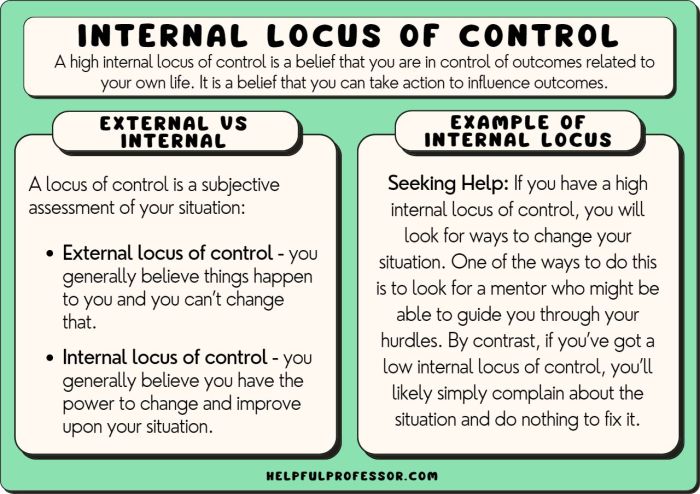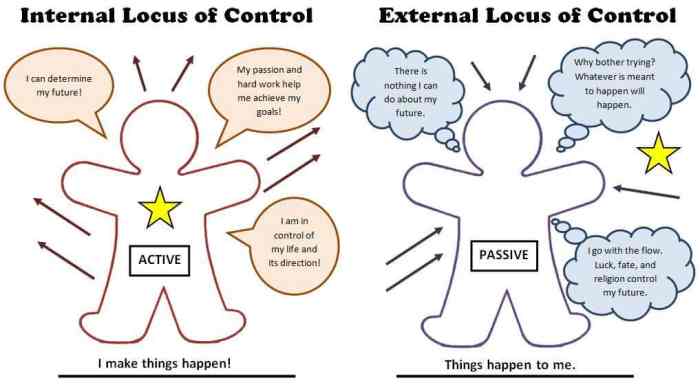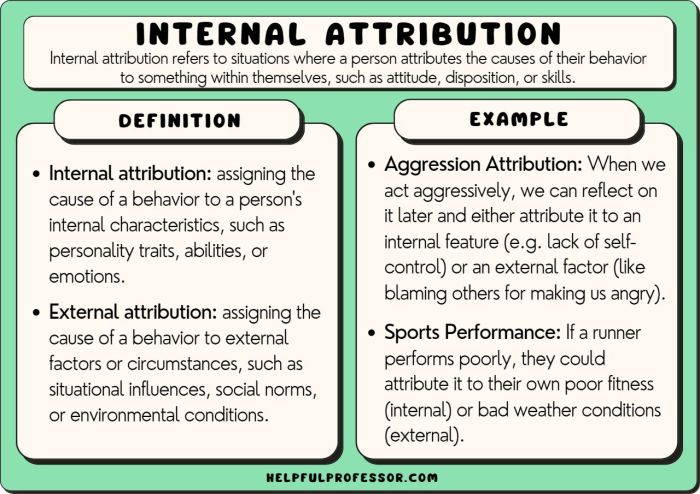The Locus of Control and Attributional Style Test, a cornerstone in psychology, unveils the intricate interplay between an individual’s perceived control over their life events and their characteristic ways of attributing causality to those events. This test provides a valuable tool for comprehending the psychological underpinnings of human behavior and its implications for well-being.
Delving into the concept of locus of control, the test distinguishes between internal, external, and powerful others orientations, shedding light on how individuals perceive the sources of their successes and failures. Furthermore, the attributional style component examines how people explain the causes of their own and others’ behaviors, revealing patterns that shape their emotional responses and coping mechanisms.
Introduction to Locus of Control and Attributional Style Test

The locus of control is a psychological concept that refers to an individual’s perception of the extent to which they have control over the events in their lives. It can be categorized into three types: internal, external, and powerful others.
An attributional style test measures how individuals attribute their successes and failures to internal or external factors.
Understanding locus of control and attributional style is crucial in psychology as it influences various aspects of an individual’s behavior, such as motivation, coping mechanisms, and mental health.
Methods and Procedures for Locus of Control and Attributional Style Test
Administration:The test can be administered individually or in a group setting. It typically consists of a series of questions or statements that the individual responds to on a Likert scale.
Scoring and Interpretation:The responses are scored to determine the individual’s locus of control and attributional style. Internal locus of control is indicated by a tendency to attribute outcomes to personal factors, while external locus of control is characterized by attributing outcomes to external factors.
Reliability and Validity:The locus of control and attributional style test has been shown to have good reliability and validity. It has been widely used in research and clinical settings.
Applications of Locus of Control and Attributional Style Test
Clinical Settings:The test can help clinicians understand the patient’s perception of control and how it influences their coping mechanisms. This information can guide treatment interventions.
Research:The test is used in research to investigate the relationship between locus of control and attributional style and various psychological outcomes, such as academic achievement, health behaviors, and well-being.
Educational Contexts:The test can help educators understand how students’ locus of control and attributional style affect their motivation and learning strategies.
Variations and Adaptations of Locus of Control and Attributional Style Test
Different Versions:There are different versions of the test designed for specific populations, such as children, adolescents, and adults.
Cultural Adaptations:The test has been adapted for use in various cultural contexts to ensure cultural sensitivity.
Tailoring to Research Questions:The test can be tailored to address specific research questions by modifying the items or adding additional scales.
Limitations and Criticisms of Locus of Control and Attributional Style Test
Potential Biases:The test may be subject to social desirability bias, where individuals respond in a way they believe is socially acceptable rather than reflecting their true beliefs.
Construct Validity:Some researchers have questioned the construct validity of the test, arguing that it may not fully capture the complexity of locus of control and attributional style.
Generalizability:The test may not be generalizable to all populations and cultures.
Clarifying Questions: Locus Of Control And Attributional Style Test
What is the purpose of the Locus of Control and Attributional Style Test?
The test aims to assess an individual’s locus of control, or their perceived level of control over life events, and their attributional style, or how they explain the causes of their own and others’ behaviors.
How is the test administered and scored?
The test typically involves a series of questions or statements that participants respond to on a scale. The responses are then scored to determine the individual’s locus of control orientation and attributional style.
What are the applications of the test?
The test has applications in clinical, research, and educational settings. It can be used to understand individual differences in coping mechanisms, emotional responses, and behavior patterns.



